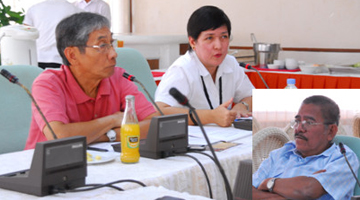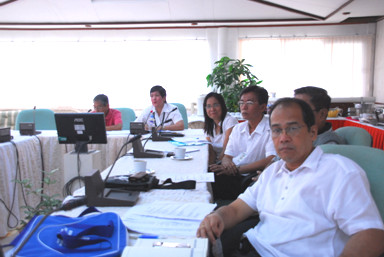 Los Baños, Laguna ─ The age-old clash between sustainability of wood supply and economic growth may soon come to a head through the “Industrial Tree Plantation (ITP) Action Program on the Establishment of Commercial Plantations and the Efficient Utilization of Wood Products in the Caraga Region”.
Los Baños, Laguna ─ The age-old clash between sustainability of wood supply and economic growth may soon come to a head through the “Industrial Tree Plantation (ITP) Action Program on the Establishment of Commercial Plantations and the Efficient Utilization of Wood Products in the Caraga Region”.
To ensure smooth implementation, program implementers recently converged at the PCARRD headquarters to level off on their plans and activities, expected outputs of the program, line item budgets, and their respective terms of reference.
Funded by the Council, this P34.5-million program targets three major concerns ─ (1) improving the productivity of tree plantations through appropriate technologies; (2) establishing plantation-based family/community enterprises; and (3) improving the following: the policy and institutional infrastructure for plantation development, the competitiveness of Philippine wood products, and the economic status of smallhold farmers.
To meet these aims, the program is divided into three subprograms – (1) Production of high quality planting materials; (2) Establishment of smallhold processing and enterprise development for ITP; and (3) Harvesting, biometric, socioeconomic, and policy studies of ITP-based industry.
Virgilio C. dela Cruz, regional technical director (RTD) of the Department of Environment and Natural Resources (DENR)-Caraga and national program leader, stressed the importance of the program for Caraga, “which supplies 52% of our country’s logs. Of this volume, 86% comes from planted trees”, he added.
 RTD dela Cruz further illustrated that log production from both natural and planted stands in the area have been steadily declining since 2001. To supply the yearly demand for Caraga, dela Cruz detailed that “we need 38,056 hectares of productive plantation per year that is yielding 200 cubic meters per hectare”. If the demand for the whole Mindanao (Regions IX to XIII) is considered along with the same yield (200 cubic meters per hectare), the plantation area needed increases to 12,939 hectares per year.
RTD dela Cruz further illustrated that log production from both natural and planted stands in the area have been steadily declining since 2001. To supply the yearly demand for Caraga, dela Cruz detailed that “we need 38,056 hectares of productive plantation per year that is yielding 200 cubic meters per hectare”. If the demand for the whole Mindanao (Regions IX to XIII) is considered along with the same yield (200 cubic meters per hectare), the plantation area needed increases to 12,939 hectares per year.
With this demand and more than 441,000 hectares available as potential areas for ITP, small farmers and people’s organizations are still reluctant to go into the ITP enterprise. They point to low yields and equally low financial returns as the primary deterrents. Because of this, investors too have been wary of spending on ITP.
DENR says that the low adoption rate of appropriate technologies may be the major culprit for the low yields. The farmers either lack the knowledge on the technology or lack the skills to use the available technologies.
In response, this program banks heavily on technology transfer and extension services “to play a major role in bringing back the tree farmers’ enthusiasm for ITP”. It also will have a strong social component as it seeks to involve people’s organizations and establish community-based enterprises. The program’s arsenal includes technical input, skills and knowledge, standards setting, and policy advocacy.
Aside from the DENR-Caraga, other agency partners in the program include the Forest Products Research and Development Institute, and the University of the Philippines Los Baños - College of Forestry and Natural Resources (UPLB-CFNR). Each of the implementers is leading one subprogram.
The program will be monitored by the Council’s Forestry and Environment Research Division headed by acting director, Dr. Leila C. America. Also involved in ensuring the success of the program is Dr. Florentino O. Tesoro, the chair of the Forestry Cluster and also one of the senior advisers of the program.
The inception meeting allowed all involved to weigh in the issues of implementation and monitoring. In addition, the inception meeting was an opportune time to acquaint them with the PCARRD and Department of Science and Technology policy and guidelines governing technical and financial monitoring of the program.
Incidentally, DENR-Caraga is a member of the Caraga Consortium for Agriculture and Resources Research and Development (C-CARRD), one among 14 of the Council’s regional R&D consortia. This ITP program has a total of 11 project components in which 3 projects are ongoing; 4 are still to be funded; and another 4 are slated to start and end on March 2014.
